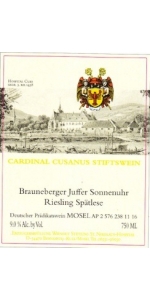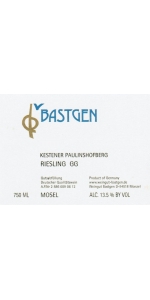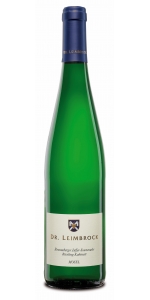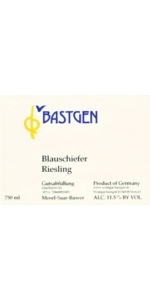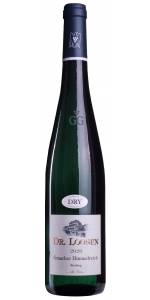St. Nikolaus Graacher Himmelreich Riesling Kabinett 2022
6 bottles with free shipping for: $168.00
12 bottles with free shipping for: $288.00
| BUY MORE! SAVE MORE! | ||||||||||||||||||||
|
| Country: | Germany |
| Region: | Mosel |
| Winery: | St. Nikolaus-Hospital |
| Grape Type: | Riesling |
| Vintage: | 2022 |
| Bottle Size: | 750 ml |
St. Nikolaus Graacher Himmelreich Riesling Kabinett is a delicious wine with good alcohol, acidity and sweetness.
RS: 55 grams/liter
Acidity: 7.8 grams/liter
ABV: 7.5%
Goes well with Asian cuisine with some spiciness.
St Nikolaus-Hospital Cusanusstift is the oldest estate in the Middle Mosel region, founded in 1458 by philosopher Nikolaus von Kues, the best known ancestor of the town of Bernkastel-Kues. He became Bishop and Cardinal then founded the St Nikolaus Hospital, a social service institution that has been functioning since 1465. Over the years, this award-winning producer has received numerous medals for his wines, and is a member of the "Bernkasteler Ring". The equipment at the winery is state of the art and the winemakers are among the finest ones in Germany. The estate also operates the Vinothek, one of Europe's most beautiful tasting facilities which gathers 140 of Germany's top producers and represents a major tourist destination.
The vineyard is located along the Mosel River and measures 15 hectares (37.05 acres) total, including the following sites: Wehlener Sonnenuhr, Graacher Himmelreich, Graacher Domprobst, Bernkastler Badstube, Bernkastler Graben, Brauneberger Juffer and Braunberger Juffer-Sonnenuhr. The 40 year-old vines are planted on steep, slate soil.
St. Nikolaus Brauneberger Juffer-Sonnenuhr Riesling Spatlese is made from 100 percent Riesling.
"Sonnenuhr" means sundial. The vineyard is facing the small town of Brauneberg formerly Dusemond. It's a steep slate slope on the Mosel, with a south-southeast exposure.
Full-bodied Riesling with typical Devonian slate qualities. Luscious fruit; nice minerality, length and acidity.
Bastgen Kestener Paulinshofberg Riesling Kabinett is 100 percent Riesling.
Kesten is a small village right by the Mosel surrounded by steep vineyards called Paulinsberg (=hills of Saint Paul). The vines grow on bridle clay slate near the river - a classic terroir that has been cultivated with vines ever since Roman times. Riesling is the most typical grape of the Mosel region that produced a fruity Kabinett with beautiful peach aromas on the nose, rich and ripe fruits on the mouth with honeyed notes and a refreshing acidity. This is a very pleasing wine.
They meticulously tend 4.5 ha (11.11 acres) of which 80% is Riesling. The soil is made of slate. Their vineyards are located in Kesten and Brauneberg, on a steep terrace, and planted to 50-year old vines. Fortunately for Bastgen, they own part of the famous Brauneberger Juffer Sonnenuhr. The vines produce very small, ripe berries that are very tasty.
The grapes are strongly selected, only minimal amounts of botrytis are tolerated. At time of the harvest the grapes are fully ripened with a golden color and tart acidity. After a natural sedimentation process the fermentation occurs in stainless steel tanks under cool conditions. The wine remains on the lees until April, then is gently filtered once, and bottled.
Dr. Leimbrock Brauneberger Juffer Sonnenuhr Riesling Kabinett is made from 100 percent Riesling.
Brauneberger Juffer and Juffer-Sonnenuhr are one of the most prestigious vineyards in the winegrowing region Mosel. The vineyard faces south and provides best conditions to plant the Riesling vines.
Juicy and aromatic with a wonderful drinking flow and aromas of melon, stone fruit and apple. Makes you want the next sip.
ABV: 9.1%
TA: 7.5
RS: 36.5 g/liter
Bastgen Blauschiefer Riesling is 100 percent Riesling.
Bright, clean, fresh and zesty. Grapefruit like flavors. Fruity aromas and a nice minerality, typical of the Riesling grape grown on blue slate soil. Round, rich and a very long finish.
They meticulously tend 4.5 ha (11.11 acres) of which 80% is Riesling. The soil is made of slate. Their vineyards are located in Kesten and Brauneberg, on a steep terrace, and planted to 50-year old vines. Fortunately for Bastgen, they own part of the famous Brauneberger Juffer Sonnenuhr. The vines produce very small, ripe berries that are very tasty.
Review:
"Very enticing nose of ripe pear with some white peach and floral aromas! All the elegance and delicacy we expect from high-quality Mosel riesling, but this light-bodied and dry beauty is only an entry-level wine! Long, refreshing and delicate finish. This will be a bargain in all the markets it reaches. From organically grown grapes. Drink now. Screw cap. "
- James Sucking (November 2023), 92 pts
A heavenly, full-bodied dry Riesling with forceful minerality from 100-year-old vines grown in the blue slate soil of Graach.
Graach is a small village in the Mosel valley. It’s steep slate slopes produce wines that combine elegance with rustic strength. Grosses Gewächs (GG) is the designation for an estate’s best dry wine from a Grosse Lage (grand cru) vineyard. This limited-production wine was fermented with indigenous yeasts and kept in the barrel, on the full lees, for a year before bottling. The extended maturation time allows the wine to develop greater texture and a deeper natural harmony. This is a fully ripe wine, with vibrant aromatics and a pronounced acidity that gives it a brilliant structural precision.
Review:
Convincing proof that 2020 is an excellent vintage for dry GG on the Mosel! Cool and stony with delicate white-peach and white-currant aromas. Really takes off at the intensely slatey and racy finish.
-James Suckling 95-96 Points
Gessinger Zeltinger Sonnenuhr Riesling Spatlese St. Josef is made from 100 percent Riesling.
The Zeltinger Sonnenuhr Riesling Spätlese St. Josef - formerly know as Josefsberg- was produced from fruit harvested from 120-year-old vines in a prime Rothlay part of the vineyard known locally as Josefsberg, next to the cross of St. Josef - the patron of vineyard growers. Here grow old, ungrafted Riesling vines whose particular small and loose grapes develop a lot of aroma.
It was made from fruit picked at the end of the harvest and was fermented down to sweet levels of residual sugar. It offers a backward nose made of white peach, melon, smoke, herbs, and minerals. On the pleasant racy palate and the wine leaves a beautiful feel of ripe fruits packed into zesty minerals in the finish. The featherlight side of this Spätlese paired with its flavor intensity are simply a thing of beauty. However, during the years this wine will reveal all its facets.
Perfect match to Asian cuisine as well as spicy food.
- back
All older vintage wines have been purchased from a single collectors cellar. Pictures can be requested before shipment.
Octopoda Pinot Noir Russian River is made from 100 percent Pinot Noir.
10 months in 40% new French oak
Beautiful garnet color with aromas of bing cherry, red raspberry, baking spice and subtle vanilla notes. On the palate, flavors are of concentrated red and blue fruit, with a core of cherry and dark raspberry with purple violet floral notes. Medium bodied with balanced acidity that lifts the flavors


